Features of a wedding during pregnancy

The wedding ceremony is a great sacrament that bestows a blessing on a new family for union. Many married couples go to church to get married. There are situations when the bride goes through this ceremony, being in an interesting position.
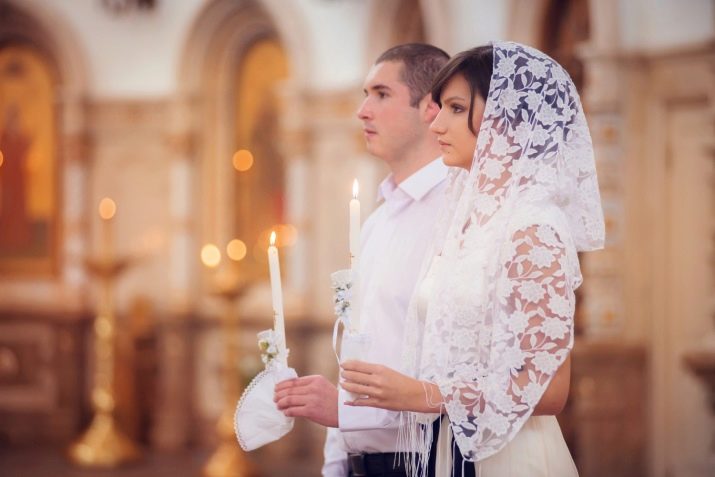
When can you get married?
Ignorant people believe that it is impossible to get married during pregnancy, since the child was conceived without official registration of marriage. And if a new life was born when the parents were already a legitimate husband and wife, then they continue to assert that an intimate relationship is a sin, and it is not worth putting its results on public display, especially to go to church and take part in any rituals.
In fact, a pregnant woman is considered already blessed if a new man could be born in her womb. Therefore, you should not pay attention to the opinions of others. A representative of any church will immediately approve the decision of the spouses to get married if the woman is in an interesting position.
It is better to appoint a wedding as early as possible, if by this time it will be possible to have time to prepare well for it. It is worth remembering that over time it becomes difficult for a pregnant woman to go out once again, and even more so to stand for a long time (the wedding ceremony lasts at least 60 minutes). Therefore, the determining date for the wedding will be the one when the woman will feel good and will find the strength to carry out the wedding ceremony in accordance with all the canons of the Orthodox Church. This means that, in addition to the hourly sacrament itself, the spouses will have to participate in the Divine Liturgy, which can last up to 4 hours.
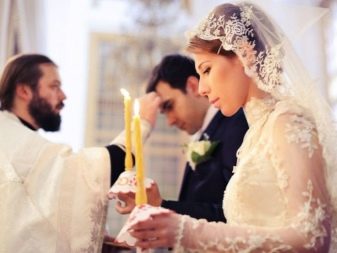

Not every woman in position due to toxicosis, aching pain in the lower back, legs and head is able to withstand such a long procedure. Therefore, before deciding to get married, being pregnant, you need to evaluate your physical strength.
It is possible and necessary to get married if both spouses who have entered into an official union (having a marriage certificate) are true believers, show mutual respect for each other and both want to be married.
An inalienable requirement: before performing the rite, you must confess and receive communion, and then observe a three-day fast. But for pregnant women, the last requirement is canceled, since they need to eat well so that the baby receives all the substances he needs.
Confession is compulsory for anyone who wants to be married. Some people are embarrassed to tell the priest some stories from their lives, however, the representative of the church will always listen carefully to the one who is confessing and will find the right words to support him and inspire him to further life according to the law of God. After that, you can take communion.
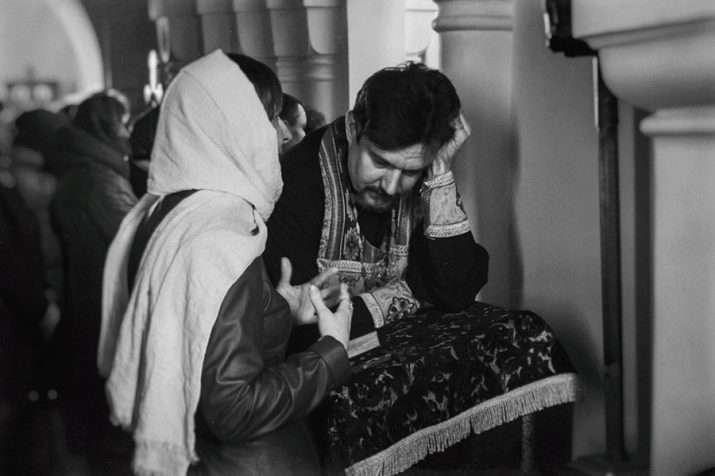
At a number of organizational points, the representatives of the church discuss how many will be present at the wedding ceremony, the exact date and time of its holding. While waiting for the sacrament to be performed, a woman must pray to the Mother of God that the wedding will take place on time and in accordance with all church rules.
The question of whether it is worth holding a wedding ceremony when a replenishment is expected in the family, each couple decides for themselves. There are no canonical prohibitions on performing the sacrament during pregnancy. Modern young people in general often register relationships only after they find out about the imminent appearance of a baby or when the child has already been born. Therefore, weddings during pregnancy are now quite common.
As a rule, believing partners want to get married. If one of the spouses is a representative of a different faith, but sincerely wishes to be married, the priest will give the go-ahead for the ceremony. In this case, the non-believer will pray for the well-being of his soul mate. Such a family, from the point of view of church canons, is also complete.
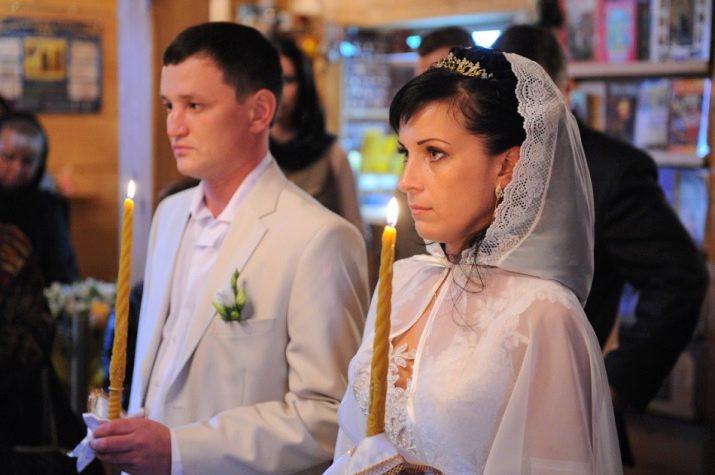
When should you not do this?
You cannot perform a wedding ceremony if one of the spouses is against it. A forced wedding, under pressure from the other half, parents, paying tribute to fashion, is not allowed. Both the man and the woman must consent to the wedding, only on the basis of their personal voluntary motives. The priest will ask about free will during the preliminary conversation. Also, you can not get married when you want it. There are days when wedding ceremonies are not held. These include: fasting, Christmas Eve of major holidays, Wednesday and Friday (fast days), Christmastide.
You can learn more about the days allowed for the wedding by checking in the temple where you are going to hold the sacrament. Only baptized Orthodox spouses can get married.
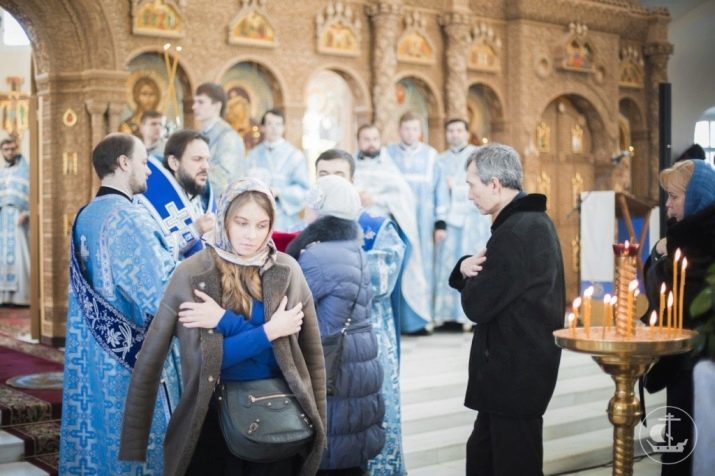
The following are not allowed to the wedding ceremony:
- representatives of other beliefs;
- persons who have not officially registered their marriage (exception - the official registration is scheduled for the next day after the sacrament of the wedding);
- unbelievers;
- relatives;
- minors;
- people who are in an unbroken marriage;
- unbaptized;
- people getting married (getting married), the fourth and subsequent times;
- people with mental disorders.
In exceptional situations, a church representative may consent to a wedding ceremony with a representative of another faith, if the children born in this marriage are baptized and raised according to the laws of the Orthodox faith.
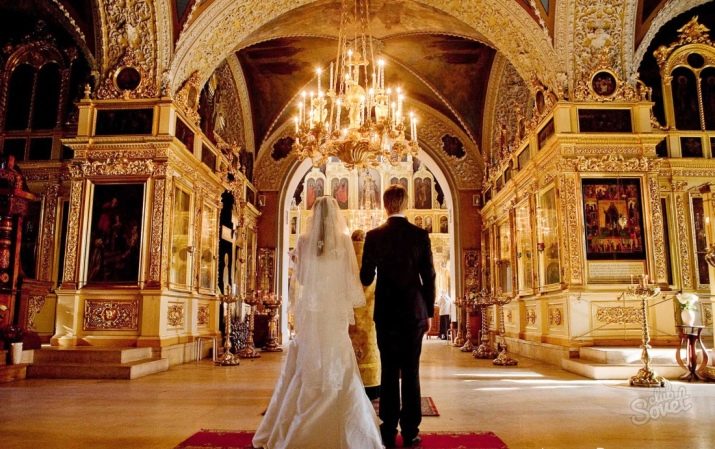
Preparing for the sacrament
All church sacraments (including weddings) should be approached as seriously and responsibly as possible. Preparation for the wedding, conventionally, is divided into two stages.
The first stage is organizational. This includes: setting a wedding date, choosing clothes for the ceremony, buying all the necessary attributes:
- wedding rings (gold for men and silver for women, wedding wedding rings can also be used, but before the ceremony, the priest must consecrate them);
- candles;
- the icon of the Savior and the Mother of God;
- two snow-white towels.
Spouses must have a cross body with them.
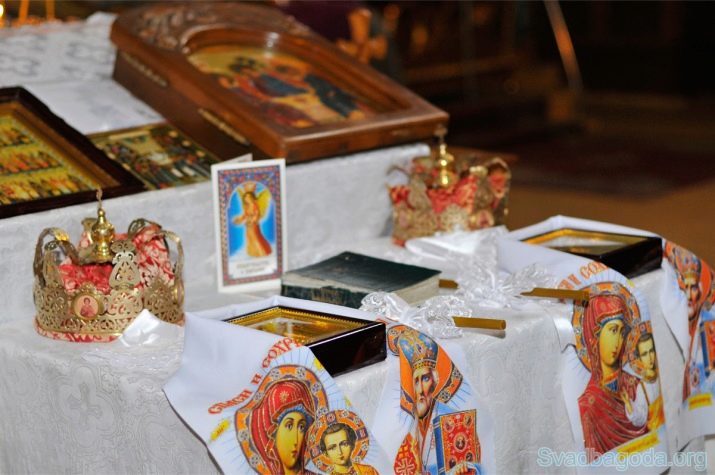
Second stage of preparation - internal self-improvement. At this stage, it is assumed that both spouses will go to confession before the wedding and then commune. At confession, everyone should tell the priest about their sins before the Savior and loved ones, and sincerely repent of them. Before partaking of the sacrament, fasting (whenever possible) and prayers must be read.
The severity of fasting is determined for each individually, taking into account the person's closeness to church, his state of health, peculiarities of living conditions and other factors. For pregnant women and those who have recently given birth, the fast is not as strict as prescribed in church rules.
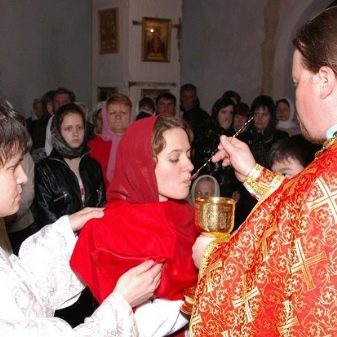

How will the wedding be held?
The wedding ceremony in the Orthodox Church is conventionally divided into two stages: the introductory and the action itself.
The introductory phase involves the betrothal of the spouses as confirmation of mutual promises. The betrothal takes place after the Divine Liturgy. The meaning of this action: the husband accepts his spouse from the Lord. Accordingly, as soon as the clergyman introduced the couple to the church, their new life together according to divine laws is considered to have begun. After that, the minister of the church blesses the spouses three times (in turn). Those, in turn, are baptized and then receive lighted candles from the priest. This attribute has several symbolic meanings: a symbol of pure love, chastity, God's grace.
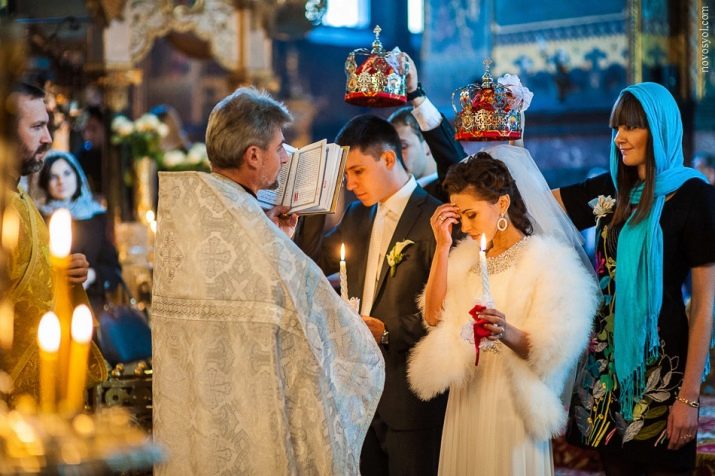
The priest walks with a censer and reads a prayer for the betrothed: about the blessing for posterity and the performance of good deeds, about the fulfillment of petitions related to the salvation of the soul. At this time, everyone in the church bows their heads. Further, the priest alternately puts on the rings to the spouses and signs them with the banner of the cross three times. Then the husband and wife exchange these attributes three times (the symbol of the Holy Trinity). The priest reads a prayer for the blessing of the wedding couple and the sending of a Guardian Angel to them, who will protect them and guide them on the right path in a new clean life. The first stage of the wedding is considered completed at this point.
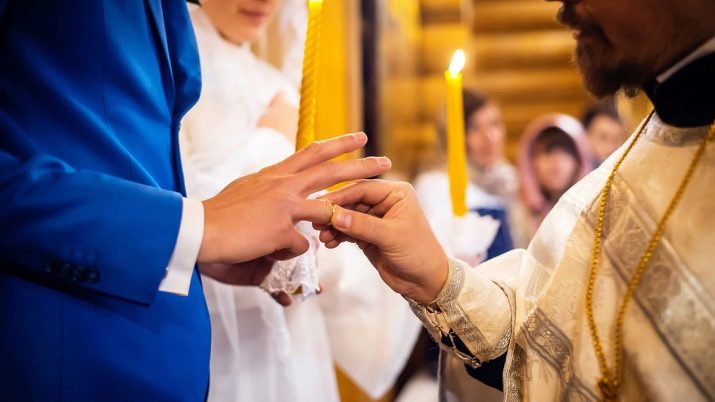
The second part of the wedding begins when the young with candles in their hands stand in the middle of the church. The priest walks with a censer, and the choir sings psalm No. 127. The newlyweds stand on the towel and answer the clergy's questions related to the voluntary expression of their will to conduct the ceremony and the lack of marriage promises given to third parties. The priest blesses the young (in turn) with the banner of the cross with the help of crowns. After that, the groom kisses the image of the Savior on his headdress, and the bride on hers - the image of the Mother of God. The crowns are put on the heads of the spouses. The priest reads the prayer 3 times and blesses the new family. Then an excerpt from the Gospel of John is read, concerning the newly formed union, a prayer for harmony in relationships, honesty towards each other, life according to the church commandments.
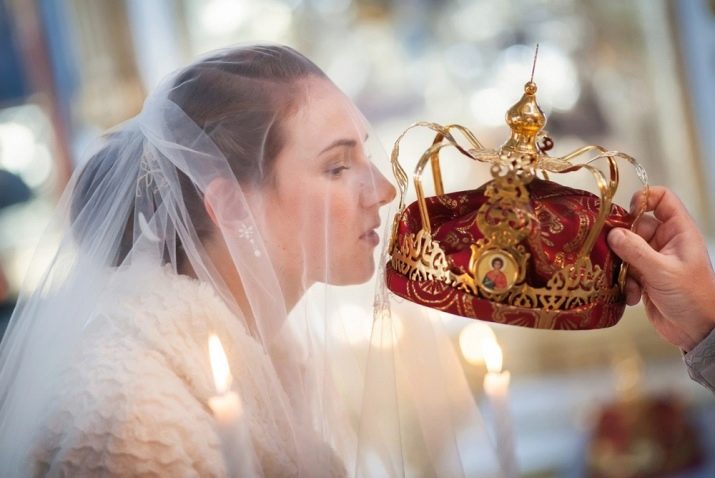
Then all those present together with the young people read the prayer "Our Father" (you should know by heart). The priest brings the cup with Cahors, blesses her. First, the husband drinks wine - he does it three times. Then the spouse repeats the same actions. The priest takes the right hands of the young people, covers them with an epitrachilia and puts them over his palm, which symbolizes the transfer of the spouse to the man from the church. Three times the young walk around the lectern - a symbol of a common fate for two.
The crowns are removed from the young. The representative of the church congratulates the spouses. Prayers are read, listening to them, the spouses bow their heads.When the priest has finished reading, as a symbol of the birth of a new Christian family, the couple give each other a short kiss. At the end of the wedding, the young people are brought to the royal doors, where everyone must kiss their icon (the husband - the Savior, the bride - the Mother of God), and then - change. Then the spouses kiss the cross, offered by the representative of the church, and receive two icons for life storage, which are considered the main amulets of the family.
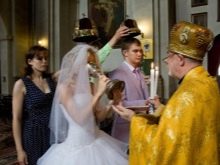
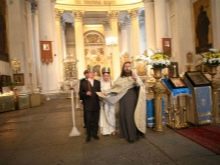
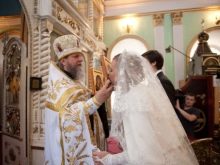
For information on whether it is possible to get married to a pregnant woman, see the next video.








